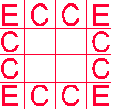
Community Education
European Dimensions

INTRODUCTION
|
ACTIVITIES 1996 - 1997 |
ACTIVITIES 1997 - 1998 |
ACTIVITIES 1998 - 1999 |
ACTIVITIES since 1999 |
European
Consortium of Social Professions with
Educational and Social Studies - ECSPRESS
Thematic
Network: ‘Social Professions for a Social Europe’
SOCRATES/ERASMUS programme of the EC
The consortium ECSPRESS (European Consortium of Social Professions with
Educational and Social Studies) is constituted by a binding agreement under
German law between three European academic organisations:
·
The
'European Association of Schools of Social Work' (EASSW)
·
FESET
(Formation d´Educateurs Sociaux Européens / European Social Educator
Training)
prior: EATCSECW (The 'European Association
of Training Centres for Socio-Educational Care Work)

·
The
'European Centre for Community Education' (ECCE).
The co-ordinating institution is the Fachhochschule Koblenz (University of
Applied Sciences). The ECCE bureau is used as its administrative centre.
A further four prominent European and international organisations concerned
more directly with professional aspects in the field of the social
professions have the status of affiliated members and will contribute their
expertise and resources as appropriate to the activities of the Network:
· The 'International Federation of Social Workers' (IFSW; membership until February 1999)
· The 'International Association of Social Educators' (AIEJI)
· The 'Fédération Internationale des Communautées Educatives'(FICE)
· The 'International Council on Social Welfare' (ICSW)
The organisations linked together by this thematic Network are the international lead bodies promoting the highest academic and professional standards in the social professions.
The aims of the thematic Network arise from the analysis and can be summarised under four general headings:
· To contribute to the definition and implementation of a level of professional competence in the social professions in Europe appropriate to the current social tasks faced by European societies which become increasingly aware of their complexity, their divisions, their interdependence and their multicultural nature.
· To foster the development of European dimensions in the training of the social professions as a means of intensifying and consolidating the critical and constructive cross-national discourses in the discipline which have been developing in the past decade.
· To ensure that the growing number of exchanges of teaching staff, practitioners and students between European countries get well prepared and evaluated in order to maximise the impact of these exchanges in terms of new practice methods, didactic approaches and comparative data.
· To create an inter-disciplinary forum in which existing professional boundaries can be explored imaginatively, shared tasks like the promotion of the rights of children or the fight against discrimination and racism be identified and new forms of co-operation be promoted.
The results of the ERASMUS evaluation conference in Koblenz/D 1996 (SEIBEL/LORENZ, 1998) and the preparatory work between the partner organisations led to the identification of three thematic focal points:
1. European Dimensions in the Curriculum Development of the Social Professions
2. The Role of the Social Professions in fighting Social Exclusion
3. Social professions in changing socio-political contexts in Europe
They were developed in a three-phases model over three years consisting of orientation, targeted assistance for implementation and broad, differentiated dissemination accompanied by evaluation.
